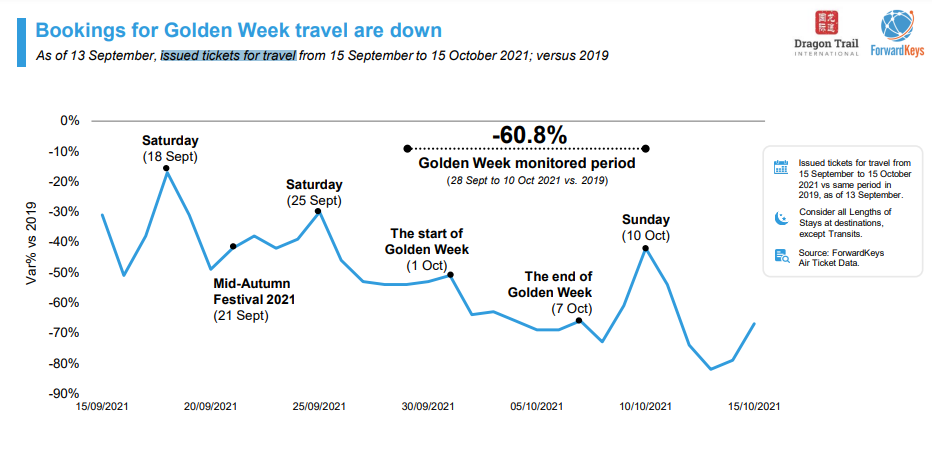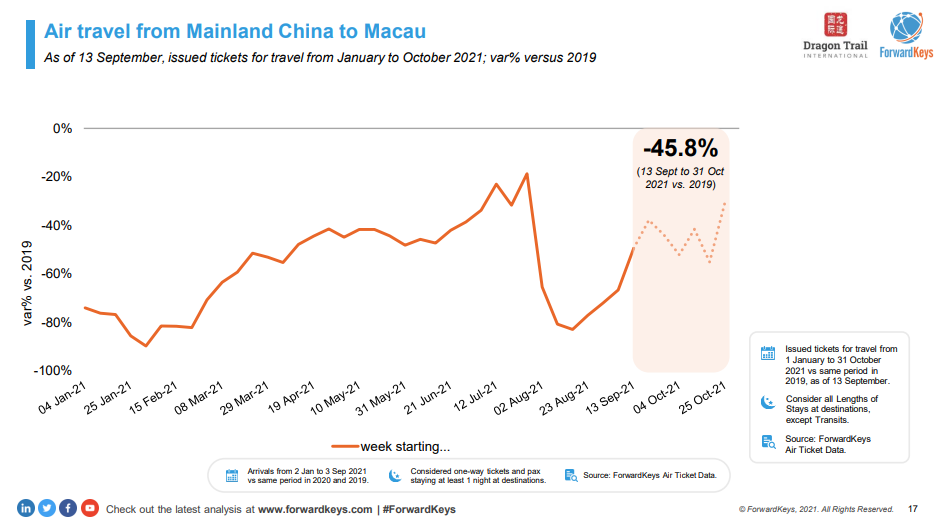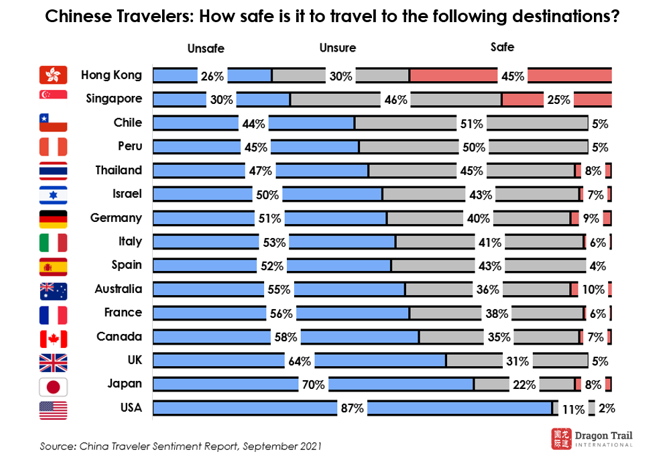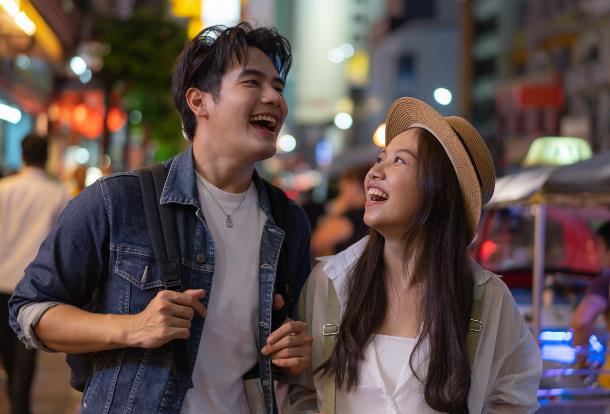China’s travel sector records lower demand in booking numbers after recent Covid-19 cases, industry researchers have found.
For the upcoming National Day holiday, the number of issued tickets for travel was down by over 60%, according to data provided by ForwardKeys during its joint webinar with Dragon Trail International on Thursday.

Issued tickets for travel from mainland China to Macau for the period from Sep 13 to Oct 31 declined by nearly 46% from pre-pandemic 2019 levels. An increasing number of mainland Chinese visitors to Macau are now staying in the city for 3-5 nights, according to ForwardKeys.

Dragon Trail International’s fourth China Traveler Sentiment Report found that more Chinese are now willing to consider travel, as long as safety measures are being met. Despite this summer’s COVID outbreak in China, survey respondents expressed a stronger desire to travel and relax than in previous surveys, and growing frustration around restrictions and outbreaks.
43% of respondents said they would “travel cautiously,” up from 31% in Dragon Trail’s March 2021 survey. The proportion who said they wouldn’t travel dropped from 39% in March to 32%, while those who said they were “eager to travel” stayed the same at 20% of respondents.
Perceptions about the safety of overseas destinations have declined over the last six months, yet at the same time, Chinese travelers remain highly receptive to and inspired by information about international destinations. Attitudes about inbound travel are also fairly welcoming, although opinions about quarantine policies are mixed.
Outbound Travel
Global vaccination rates have increased significantly since Dragon Trail’s last traveler sentiment survey, but with rising cases and relaxation of controls around the world, the latest survey data shows that negative perceptions of safety or uncertainly has increased for all destinations. Singapore is still seen as the safest international destination out of the 13 we asked about in both surveys, but uncertainty and ratings of “unsafe” have both increased. Japan, rated one of the safest destinations in the March survey, has now dropped to a rating closer to the UK or the US. The destinations with the most stable safety perceptions are Thailand (47% “unsafe”) and Canada (54% “unsafe”). The US remains the country with the lowest safety perception, rated by 87% as “unsafe”.

Infection numbers and infection rates are much more likely to be correlated to perceptions of a destination being unsafe, compared to vaccination rates. While official travel advice is the most influential factor that would motivate Chinese travelers to venture outside the country again (76%), having zero or low infection numbers in the destination (60%), no quarantine on arrival in the destination (56%), and being fully vaccinated in China (52%) are also important.
However, it’s not all bad news for overseas destinations – despite very cautious assessments of safety outside of mainland China, 81% of survey respondent felt positively when they saw content on outbound travel. Keywords and sentiments that came up often included feeling fascinated and excited, and a craving for novelty, variety, and relaxation. Many survey respondents mentioned comfort in seeing this kind of content, as it distracts them from daily anxieties, while others said they were inspired to take notes to plan post-pandemic travel.
Inbound Travel
Despite major concerns about travel safety, and negative perceptions of safety in other countries, the survey findings reveal a willingness to reopen China to inbound travel. 53% said that the Beijing 2022 Winter Olympics should be open to all visitors with a negative PCR test and vaccination record. 25% said that the Games should be held without any spectators, as the Tokyo Olympics were, and the remaining respondents said that only domestic spectators should be allowed. In reality, COVID control measures around the Winter Olympics are expected to be much stricter than in Tokyo, but the survey results show that public opinion is more welcoming to international visitors.
Opinions are divided on the strictness of travel policies, with 30% agreeing that quarantine-on-arrival should be relaxed, and another 36% preferring even stricter quarantine for all inbound arrivals. 28% would maintain current quarantine requirements. Only 1% said that quarantine restrictions should be totally relaxed for Chinese citizens only, compared to 5% who said they should be relaxed for all arrivals regardless of nationality.
The China Traveler Sentiment Report – September 2021 is published by Dragon Trail Research, based on the survey of more than 1,000 Chinese travelers. Click here to learn more about the joint webinar of Dragon Trail International and ForwardKeys.




